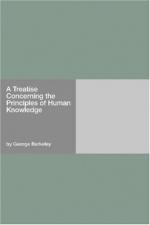108. Three analogies.—Those men who frame general rules from the phenomena and afterwards derive the phenomena from those rules, seem to consider signs rather than causes. A man may well understand natural signs without knowing their analogy, or being able to say by what rule a thing is so or so. And, as it is very possible to write improperly, through too strict an observance of general grammar rules; so, in arguing from general laws of nature, it is not impossible we may extend the analogy too far, and by that means run into mistakes.
109. As in reading other books a wise man will choose to fix his thoughts on the sense and apply it to use, rather than lay them out in grammatical remarks on the language; so, in perusing the volume of nature, it seems beneath the dignity of the mind to affect an exactness in reducing each particular phenomenon to general rules, or showing how it follows from them. We should propose to ourselves nobler views, namely, to recreate and exalt the mind with a prospect of the beauty, order. extent, and variety of natural things: hence, by proper inferences, to enlarge our notions of the grandeur, wisdom, and beneficence of the Creator; and lastly, to make the several parts of the creation, so far as in us lies, subservient to the ends they were designed for, God’s glory, and the sustentation and comfort of ourselves and fellow-creatures.
110. The best key for the aforesaid analogy or natural Science will be easily acknowledged to be a certain celebrated Treatise of Mechanics. In the entrance of which justly admired treatise, Time, Space, and Motion are distinguished into absolute and relative, true and apparent, mathematical and vulgar; which distinction, as it is at large explained by the author, does suppose these quantities to have an existence without the mind; and that they are ordinarily conceived with relation to sensible things, to which nevertheless in their own nature they bear no relation at all.
111. As for Time, as it is there taken in an absolute or abstracted sense, for the duration or perseverance of the existence of things, I have nothing more to add concerning it after what has been already said on that subject. Sect. 97 and 98. For the rest, this celebrated author holds there is an absolute Space, which, being unperceivable to sense, remains in itself similar and immovable; and relative space to be the measure thereof, which, being movable and defined by its situation in respect of sensible bodies, is vulgarly taken for immovable space. Place he defines to be that part of space which is occupied by any body; and according as the space is absolute or relative so also is the place. Absolute Motion is said to be the translation of a body from absolute place to absolute place, as relative motion is from one relative place to another. And, because the parts of absolute space do not fall under our senses, instead of them we are obliged to use their




